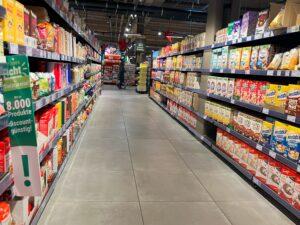Margin freeze versus VAT reduction: a solution to inflation or a field for political debate?
The government has been implementing a margin freeze since mid-March, which limits the margin on 30 basic foodstuffs to 10 percent. The measure aims to reduce inflation and curb unreasonably high margins. Opposition parties are demanding a general VAT cut, which they say would be a more permanent solution to rising food prices. However, according to the modern trade union Egyenlő.hu, the VAT cut does not guarantee lower prices, and multinational chains have repeatedly withheld such discounts from consumers.
Why did the government intervene in food prices?
 The reason for introducing the margin freeze is that, according to the government, large retail chains were operating with unreasonably high margins, which meant that consumers could buy basic foodstuffs at significantly higher prices than they actually paid.
The reason for introducing the margin freeze is that, according to the government, large retail chains were operating with unreasonably high margins, which meant that consumers could buy basic foodstuffs at significantly higher prices than they actually paid.
According to Prime Minister Viktor Orbán, retailers were applying a margin of 40 percent on eggs and over 80 percent on butter and sour cream, which is why the measure was necessary. Following the decision, Minister of National Economy Márton Nagy indicated that the margin cap could reduce food inflation by up to 2 percent.
Although food products are now more widely affected than previously introduced price caps, according to the National Trade Association (OKSZ), there is still less chance that stores will offset the measure by raising prices on other products.
VAT reduction or margin cap: which is the better solution?
While the government has decided in favor of the margin cap, opposition parties (MSZP, DK, Jobbik, Momentum, Tisza Party) are urging a reduction in the value-added tax (VAT) on food products, citing that Hungary has one of the highest food VAT rates in the EU.
However, according to Csaba Bubenkó, president of the Egyenlő.hu trade union, the VAT reduction may not mean savings for customers. Previously, sales tax was reduced for several products, but prices did not decrease because stores did not pass on the difference to consumers.
Related news
Inflation has dropped significantly, a cycle of interest rate cuts may begin, while gold soars
🎧 Hallgasd a cikket: Lejátszás Szünet Folytatás Leállítás Nyelv: Auto…
Read more >KSH: in January, consumer prices exceeded the values of the same month of the previous year by an average of 2.1 percent
🎧 Hallgasd a cikket: Lejátszás Szünet Folytatás Leállítás Nyelv: Auto…
Read more >Related news
Festival buzz at the 60th anniversary EuroShop trade fair
🎧 Hallgasd a cikket: Lejátszás Szünet Folytatás Leállítás Nyelv: Auto…
Read more >Historic price reduction at ALDI
🎧 Hallgasd a cikket: Lejátszás Szünet Folytatás Leállítás Nyelv: Auto…
Read more >A stable compass in the Hungarian FMCG sector for 20 years
🎧 Hallgasd a cikket: Lejátszás Szünet Folytatás Leállítás Nyelv: Auto…
Read more >







